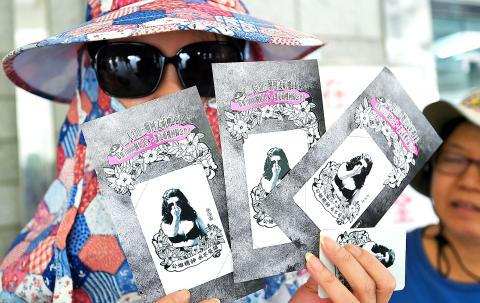The Collective of Sex Workers and Supporters (COSWAS) yesterday rallied outside the Taipei City Council building to raise awareness about the rights of prostitutes, saying that the Taipei City Government disassociating itself from the recent controversy surrounding EasyCards bearing the image of Japanese porn actress Yui Hatano reflects the local governments’ indifference toward an amendment passed in 2011 regarding the legalization of prostitution.
The demonstrators prepared stick-on EasyCard covers featuring an image of late prostitute rights activists Lee-chun (麗君) wagging her middle finger, with the slogan The prostitutes’ spirit: no compromise.
Protesters distributed the cards to city government officials who attended a council session, including EasyCard general manager Tai Chi-chuan (戴季全), who authorized the production of the controversial Hatano EasyCards.

Photo: Chang Chia-ming, Taipei Times
Protesters said the picture, taken by Playboy magazine in 1999 when it interviewed Lee-chun, was to protest then-Taipei mayor Chen Shui-bian’s (陳水扁) outlawing of licensed prostitution in Taipei and had become a symbol for their prostitutes’ rights campaign.
COSWAS secretary Hsiao Yi-ting (蕭怡婷) said that EasyCard issued the controversial cards to boost sales among men, but since the controversy surfaced, the city government had shirked its responsibility by claiming that it had not been involved in the making of the cards.
This attitude shows that there is no way for unlicensed prostitutes to make a living in Taiwan, she said.
COSWAS secretary Kuo Pei-yu (郭姵妤) said the legislature passed an amendment to the Social Order Maintenance Act in 2011 (社會秩序維護法), which sees both prostitutes and clients in prostitution cases punished.
The amendment also included “special permission” by which local governments can delimit “special prostitution zones” in which prostitution is legal. However, no local governments have set up such zones since the amendment was passed, she said.
At the demonstration, an unlicensed prostitute identified as Cola (可樂) said the police frequently carry out inspections at her workplace causing her to suffer financially, adding that one of her colleagues is having difficulty covering her father’s medical bills, which she said is about NT$50,000 per month.
She said that prostitutes are not so different from Hatano, as they all work in the sex industry and since the city embraced Hatano, it should also legalize prostitution.
The demonstrators also raised awareness about a possible demolition of the historic Wenmeng Building (文萌樓), a former brothel in the city’s Datong District (大同) dating back to the nation’s Japanese colonial period, which the group uses to house its headquarters and a private sex industry museum it runs and provides lodging for former licensed prostitutes.
Kuo said that a group of construction companies have expressed an interest in buying the plot, which would result in the group being evicted.
She said her group has launched an online poll to gauge public opinion on funding a project to help the group buy the plot from its owner so that the building can be preserved.

Alain Robert, known as the "French Spider-Man," praised Alex Honnold as exceptionally well-prepared after the US climber completed a free solo ascent of Taipei 101 yesterday. Robert said Honnold's ascent of the 508m-tall skyscraper in just more than one-and-a-half hours without using safety ropes or equipment was a remarkable achievement. "This is my life," he said in an interview conducted in French, adding that he liked the feeling of being "on the edge of danger." The 63-year-old Frenchman climbed Taipei 101 using ropes in December 2004, taking about four hours to reach the top. On a one-to-10 scale of difficulty, Robert said Taipei 101

Nipah virus infection is to be officially listed as a category 5 notifiable infectious disease in Taiwan in March, while clinical treatment guidelines are being formulated, the Centers for Disease Control (CDC) said yesterday. With Nipah infections being reported in other countries and considering its relatively high fatality rate, the centers on Jan. 16 announced that it would be listed as a notifiable infectious disease to bolster the nation’s systematic early warning system and increase public awareness, the CDC said. Bangladesh reported four fatal cases last year in separate districts, with three linked to raw date palm sap consumption, CDC Epidemic Intelligence

Taiwanese and US defense groups are collaborating to introduce deployable, semi-autonomous manufacturing systems for drones and components in a boost to the nation’s supply chain resilience. Taiwan’s G-Tech Optroelectronics Corp subsidiary GTOC and the US’ Aerkomm Inc on Friday announced an agreement with fellow US-based Firestorm Lab to adopt the latter’s xCell, a technology featuring 3D printers fitted in 6.1m container units. The systems enable aerial platforms and parts to be produced in high volumes from dispersed nodes capable of rapid redeployment, to minimize the risk of enemy strikes and to meet field requirements, they said. Firestorm chief technology officer Ian Muceus said

MORE FALL: An investigation into one of Xi’s key cronies, part of a broader ‘anti-corruption’ drive, indicates that he might have a deep distrust in the military, an expert said China’s latest military purge underscores systemic risks in its shift from collective leadership to sole rule under Chinese President Xi Jinping (習近平), and could disrupt its chain of command and military capabilities, a national security official said yesterday. If decisionmaking within the Chinese Communist Party has become “irrational” under one-man rule, the Taiwan Strait and the regional situation must be approached with extreme caution, given unforeseen risks, they added. The anonymous official made the remarks as China’s Central Military Commission Vice Chairman Zhang Youxia (張又俠) and Joint Staff Department Chief of Staff Liu Zhenli (劉振立) were reportedly being investigated for suspected “serious